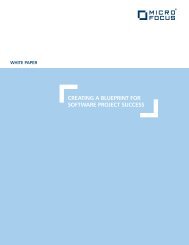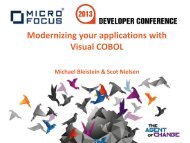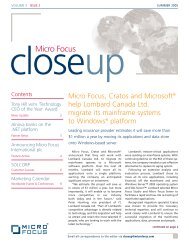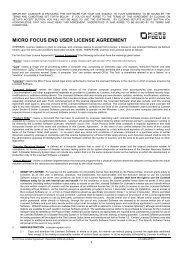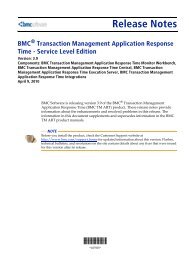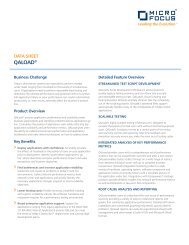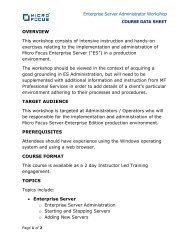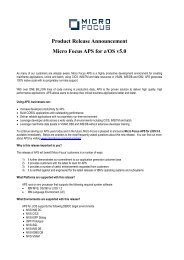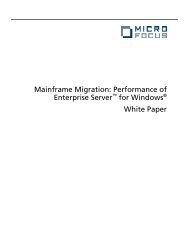Optimizing Your Visual COBOL Applications Darren ... - Micro Focus
Optimizing Your Visual COBOL Applications Darren ... - Micro Focus
Optimizing Your Visual COBOL Applications Darren ... - Micro Focus
Create successful ePaper yourself
Turn your PDF publications into a flip-book with our unique Google optimized e-Paper software.
<strong>Optimizing</strong> <strong>Your</strong> <strong>Visual</strong> <strong>COBOL</strong><br />
<strong>Applications</strong><br />
<strong>Darren</strong> Self & Chris Glazier<br />
<strong>Micro</strong> <strong>Focus</strong>
Performance matters because…<br />
2
Agenda<br />
• Locating Bottlenecks<br />
• Tuning your Files and the<br />
File Handler<br />
• Configuring OpenESQL<br />
Database Access<br />
• <strong>Optimizing</strong> <strong>Your</strong><br />
Application<br />
3
Out of the Box Performance
Finely Badly<br />
Tuned
The choice is yours…
Locating the Bottlenecks<br />
• <strong>Visual</strong> <strong>COBOL</strong> Profiler<br />
– Native code<br />
– Report at <strong>COBOL</strong><br />
source level<br />
• <strong>Visual</strong> Studio Profiler<br />
– Managed code<br />
– Report at method level<br />
7
<strong>Visual</strong> <strong>COBOL</strong> Profiler<br />
• Works with native code<br />
• Compile with PROFILE directive<br />
• Run application to generate .prf<br />
• Run Profiler to create report<br />
• What information does it provide?<br />
– Gives the total execution time<br />
– By section and paragraph<br />
8
<strong>Visual</strong> Studio Profiler<br />
• Integrated with <strong>Visual</strong> Studio IDE<br />
• Works with .NET managed code<br />
• Allows comparison of profiling data<br />
between different runs<br />
• What information does it provide?<br />
– Gives total execution time by module<br />
– Shows hot code execution paths<br />
9
Tuning <strong>Your</strong> Files and the File Handler<br />
• Access Permissions<br />
• File Definition - Keys<br />
• Fine Tuning EXTFH.CFG<br />
10
Access Permissions<br />
• Examine your data files on a per-file basis.<br />
– How are they being used?<br />
• When opening files:<br />
– Don’t just use open I-O for everything<br />
– Use exclusive access where possible<br />
– Otherwise, allow only readers<br />
– Only where absolutely necessary, give<br />
all others complete access to the file
Access Permissions – Sharing Modes<br />
• Can be specified in SELECT:<br />
or<br />
select test-file assign to “testfile.dat”<br />
…<br />
sharing with |all other|<br />
|no other|.<br />
lock mode is exclusive.<br />
• Can be specified on OPEN:<br />
open i-o sharing with |all other | test-file<br />
|no other |<br />
|read only|.
Access Permissions - READ<br />
Time Taken to Read Records<br />
Exclusive Access Allow Readers Allow All Others<br />
2 mins 2 secs 4 mins 23 secs 8 mins 40 secs<br />
Reading 8,000,000 records from IDX Format 8 file<br />
Sequentially
File Definition - Keys<br />
• If you don’t use it, then lose it! – each key needs<br />
to be updated for each insert and delete.<br />
• Shorter the key the better – fit more in a node<br />
2 Alternate<br />
Keys<br />
Time Taken to Create File<br />
Number of Alternate Keys<br />
3 Alternate<br />
Keys<br />
4 Alternate<br />
Keys<br />
5 Alternate<br />
Keys<br />
5 mins 48 secs 6 mins 19 secs 6 mins 29 secs 30 mins 06 secs<br />
File size<br />
2 alternates = 4,908,620,800<br />
3 alternates = 5,172,377,600<br />
4 alternates = 5,500,134,400<br />
5 alternates = 5,763,891,200
File Definition - Compression<br />
• Data compression<br />
– Minimal performance hit<br />
• Index compression<br />
– Always a performance hit, sometimes severe.<br />
– File Handler must sequentially search entire<br />
node when looking for a key
Compression<br />
Sequential<br />
WRITE<br />
Random<br />
READ<br />
Sequential<br />
READ<br />
Compression Type<br />
None Data Data + Keys<br />
5 mins 35 secs 5 mins 45 secs 9 mins 50 secs<br />
3 mins 34 secs 3 mins 46 secs 4 mins 56 secs<br />
2 mins 04 secs 2 mins 46 secs 2 mins 50 secs
It doesn’t help…
Neither does this…
Fine Tuning the File Handler – EXTFH.CFG<br />
• Options must be set in a configuration file<br />
set EXTFH=c:\extfh.cfg<br />
Can be set in <strong>Visual</strong> Studio<br />
app.config file<br />
• Set on a per file basis<br />
– INDEXCOUNT<br />
– NODESIZE<br />
– LOADONTOHEAP
INDEXCOUNT<br />
• Specifies the number of index nodes to be cached for an<br />
index file. - Default cache size used is now 32 nodes.<br />
• Use when writing files where there are multiple keys<br />
• Use when reading files randomly<br />
• Reading files – sequentially may degrade performance<br />
• Ideal INDEXCOUNT = (Max Tree Depth * No. keys) + No. keys<br />
– Use rebuild /f - to find max tree depth<br />
[XFH-DEFAULT]<br />
[file1.dat]<br />
INDEXCOUNT=42
INDEXCOUNT<br />
2 alt keys 3 alt keys<br />
5 min 48 secs 6 min 19 secs<br />
Time Taken to Create File<br />
4 alt keys 5 alt keys<br />
6 min 29 secs 7 30 mins min 32 6 secs<br />
8 million records, 5 alternate keys, resulting file 5GB
NODESIZE<br />
• The NODESIZE option specifies the size of the<br />
index nodes to use for an indexed file when it is<br />
created.<br />
• NODESIZE={512|1024|4096|16384}<br />
• Use when reading records sequentially<br />
• Avoid using with INDEXCOUNT set high<br />
[XFH-DEFAULT]<br />
[file1.dat]<br />
NODESIZE=4096
NODESIZE – Reading Records<br />
NODESIZE Sequential Access Random Access<br />
1024 3 mins 55 secs 3 mins 09 secs<br />
4096 3 mins 03 secs 4 mins 01 secs<br />
16384 1 mins 59 secs 4 mins 27 secs
LOADONTOHEAP<br />
• Forces the File Handler to load an entire file<br />
onto a memory heap<br />
• All file operations execute in memory, only<br />
writing back to disk when it is closed<br />
• Use only in exclusive mode<br />
• Use only on small files<br />
• Use with caution- Speed vs Data Integrity!<br />
[XFH-DEFAULT]<br />
[file1.dat]<br />
LOADONTOHEAP=ON
File Handling Summary<br />
• Consider tuneables on a file-per-file basis<br />
• Think about permissions.<br />
Can you use exclusive access?<br />
• Avoid key compression if possible.<br />
• Random access – calculate the optimum<br />
INDEXCOUNT figure with rebuild /f<br />
• Sequential access – look at NODESIZE<br />
• Small exclusive files – look at LOADONTOHEAP
Configuring OpenESQL Database Access<br />
• Database Drivers<br />
• OpenESQL Behavior Directive<br />
26
Database Drivers<br />
• Drivers to use<br />
– ODBC = Native Code<br />
– ADO = Managed .NET<br />
– JDBC = Managed JVM<br />
• SQL Server - ODBC vs Native Client<br />
– Do NOT use old SQL Server ODBC drivers<br />
– Use SQL Server Native Client 10.0 or higher<br />
• Oracle – ADO<br />
– Use Oracle Data Provider ODP.NET<br />
– Do not use <strong>Micro</strong>soft’s Oracle Client driver<br />
27
OpenESQL Behavior Directive<br />
• SQL(BEHAVIOR=MAINFRAME) – Fastest<br />
– data access for cursors is read only for all by default<br />
– SQL Server uses firehose cursors, Oracle and DB2 use block fetches<br />
• SQL(BEHAVIOR=ANSI) – Medium Fast<br />
– data access for cursors is updateable for all by default<br />
– SQL Server uses firehose cursors, Oracle and DB2 use block fetches<br />
• SQL(BEHAVIOR=UNOPTIMIZED) – Slowest<br />
– data access for cursors is updateable for all by default<br />
– no block fetching done<br />
– compatible with older MF products<br />
• esqlconfigw utility - Set default BEHAVIOR directive for system<br />
28
Optimization Demo
<strong>Optimizing</strong> <strong>Your</strong> Application<br />
• Application Structure<br />
• Program Structure<br />
• Data<br />
• Code<br />
30
Application Structure<br />
• It’s important!<br />
• Execution formats<br />
• Modularity<br />
31
Execution Formats<br />
• INT code<br />
– Slow, portable, dynamically loaded, not shared<br />
• GNT code<br />
– Fast, dynamically loaded, not shared<br />
• Object code<br />
– OS defined format, not directly executable<br />
– Basis for native executable formats (exe, dll etc)<br />
– More efficient than .gnt<br />
• Managed code (IL, JVM)<br />
– Third party managed environment<br />
– Portable and interoperable on that framework<br />
32
Communicating<br />
• PERFORM - very fast<br />
– Acts locally, potentially on all data<br />
– Does not take parameters<br />
• CALL - slower<br />
– Called code is external<br />
– Takes parameters<br />
– Only those parameters are affected<br />
33
Demo - Execution Formats
Managed code boundary<br />
• Compiled for JVM<br />
– Uses JNI<br />
– Notoriously slow<br />
• Compiled for .NET<br />
– Uses Platform Invoke<br />
– Minimal overhead<br />
36
Program Structure<br />
• Independent procedures<br />
• Logical separation of functionality<br />
• Use sections/paragraphs consistently<br />
37
In <strong>Micro</strong> <strong>Focus</strong>, the guidelines are...<br />
• Do...<br />
– Use SECTIONs<br />
– PERFORM these sections<br />
– Use GOBACK rather than EXIT PROGRAM<br />
• Don’t...<br />
– Use PERFORM THRU or PERFORM paragraphs<br />
– Use inter-section GOTOs<br />
– Use alter, segments, OSVS or RM PERFORM-STYLE<br />
38
A Word on ‘In line Perform’s<br />
• Excellent structured programming technique<br />
• Keep the loop condition simple<br />
– Remember it’s tested each iteration<br />
• Avoid ‘goto’s out of the loop<br />
– Code generator optimises well structured, single exit loops<br />
– Easier to understand<br />
– Avoid problems when moving to managed code
Data - Alignment<br />
• Memory organised into 4 or 8 byte words<br />
• Access across word boundaries is slow<br />
– At least twice as slow<br />
– Up to 50 times slower<br />
• Access across word boundaries gives larger code<br />
– Nine extra instructions for a 4 byte item<br />
on Itanium machines
Data – Alignment Example<br />
• This comp-5 item count-a is aligned<br />
01 grp-item.<br />
03 count-a pic x(4) comp-5.<br />
03 ch pic x.<br />
• This comp-5 item count-b is not aligned<br />
01 grp2-item.<br />
03 ch2 pic x.<br />
03 count-b pic x(4) comp-5.
Data – Alignment Example in Tables<br />
• The stride of a table should be a multiple of 4<br />
– Pad the table to ensure this is true<br />
• Misaligned table item<br />
01 tbl1 occurs 200.<br />
03 count-a pic x(4) comp-5.<br />
03 ref-a pic x(2) comp-5.<br />
03 loc-a pic x comp-5.<br />
• Aligned table item<br />
01 tbl2 occurs 200.<br />
03 count-a pic x(4) comp-5.<br />
03 ref-a pic x(2) comp-5.<br />
03 loc-a pic x comp-5.<br />
03 pic x.
Demo - Alignment Issues
Data Types - Numerics<br />
• Optimal is 4 byte integer comp-5<br />
– Signed or unsigned, but try not to mix in same statement<br />
• 1, 2 or 8 byte OK if required<br />
• Advantages<br />
– Smaller faster code<br />
– Required for some APIs<br />
– Quicker to generate
Data Types – Managed<br />
• Specify managed types whenever possible<br />
– binary-long or float instead of COMP-3 or DISPLAY<br />
– Use at 01 level<br />
• no group items where possible<br />
– Use types instead of <strong>COBOL</strong> PICs<br />
• Managed code directives<br />
– ILEXPONENTIATION”FLOAT” for exponentiation speed
Code - Arithmetic<br />
• Use operands of same type<br />
• Two operand style is always efficient<br />
– add a to b<br />
– divide c into d<br />
• Compute statement without divide operations<br />
– Split into separate COMPUTE and DIVIDE statements<br />
• Avoid using the ON SIZE error
Demo – Arithmetic Issues
<strong>Your</strong> Mission...<br />
• Identification<br />
• Awareness<br />
• Resolution<br />
• Communication<br />
– http://community.microfocus.com
Performance may feel like this...
When it should be like this...
Some Useful Checker Directives<br />
noalter<br />
noseg<br />
noqualproc<br />
noimplicitscope<br />
nocheck<br />
Improves checker speed<br />
Improves checker speed. Catches use of<br />
identical, and confusing, paragraph names<br />
Enforce use of scope delimiters<br />
Catch subtle bugs early<br />
Turn off run time checking
Some useful NCG Directives<br />
nocheck<br />
lnkalign<br />
opt<br />
litlink<br />
linkalias<br />
Turn off run time checking, including<br />
subscript, linkage and divide-by-0 checks<br />
Assert that linkage items aligned<br />
Generates faster code<br />
Turn on global optimisations. Generates<br />
faster code, but takes longer to generate<br />
Ensure calls are linked rather than<br />
dynamically bound<br />
Specify aliasing of linkage items
@microfocus or hashtag #devcon2013<br />
Follow us on LinkedIn or join the group<br />
Connect with your peers on the Community




